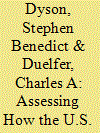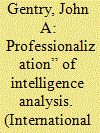| Srl | Item |
| 1 |
ID:
175600


|
|
|
|
|
| Summary/Abstract |
The successful conduct of international relations relies on deducing the intentions of friends and foes. Decisionmakers in one country must make sense of the thoughts and actions of those in other countries.
|
|
|
|
|
|
|
|
|
|
|
|
|
|
|
|
| 2 |
ID:
188288


|
|
|
|
|
| Summary/Abstract |
Like most formal organizations in the United States, the agencies in the Intelligence Community (IC) have historically comprised white men and reflected their stories and interests. In the last few decades, however, the agencies have made efforts to diversify the workforce along multiple dimensions of inequality. In response to these initiatives, researchers—to include the agencies themselves—have sought to understand and elevate the experiences of officers who identify outside of the white and male demographics, with race, ethnicity, and gender as the primary targets of these studies. In contrast, it is only in the last few years that the agencies have made efforts to increase the visibility and sense of belonging among the lesbian, gay, bisexual, transgender, queer or questioning, intersex, asexual or ally, and other sexual and gender minorities (LGBTQIA+) population in the IC. LGBTQIA + intelligence officers work in a career with a particularly fraught history: it began with the so-called Lavender Scare in the 1950s—a period during which gay and lesbian government officers were considered security risks—and it was legal for them to be fired for this reason until 1995. With a short history marked by rapid change, research on this population has been relatively slow and scant to date. What do we know about the experiences of LGBTQIA + intelligence officers, and where do we go next? This article will consider these questions and explore opportunities and challenges that the structures and cultures of the IC present to the LGBTQIA + population.
|
|
|
|
|
|
|
|
|
|
|
|
|
|
|
|
| 3 |
ID:
175594


|
|
|
| 4 |
ID:
146418


|
|
|
|
|
| Summary/Abstract |
In recent years, for the first time in the history of the U.S. Intelligence Community (IC), a debate among scholars and some practitioners has arisen about whether intelligence analysis is, or can be, a “profession”—and by what standards analytic professionalism should be defined and judged. The dominant academic view seems to be that analysis should be, but is not, a profession, defined in ways similar to those of such recognized professions as medicine and law. More recently, a version of such thinking has emerged in the Department of Defense (DoD), with the Office of the Undersecretary of Defense for Intelligence (USD(I)) mandating the development of certification and accreditation standards for personnel who perform all intelligence-related job categories in all military and civilian elements of the DoD, which the department calls the Defense Intelligence Enterprise (DIE).
|
|
|
|
|
|
|
|
|
|
|
|
|
|
|
|
| 5 |
ID:
175595


|
|
|
|
|
| Summary/Abstract |
The U.S. Intelligence Community (IC) is reaching a culminating point in its history. Since the 2016 presidential election, the U.S. IC has become embroiled in political controversies that have consumed the entire country. To what extent is this latest manifestation of the politicization of intelligence actually of the U.S. IC’s own doing? American intelligence officers nurture the belief that they are objective—not only policy neutral, but also politically neutral.
|
|
|
|
|
|
|
|
|
|
|
|
|
|
|
|